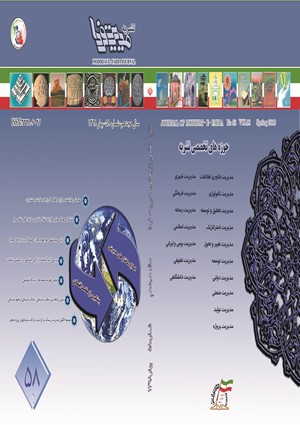A model of Human Resource Development in the public organizations of Iran by new public services approach (Case study: Ministry of Energy)
Subject Areas :
1 - Allameh Tabataba’I University
Keywords: Human resource development, New public servives, Public management paradigm, Paradigmic model ,
Abstract :
Recognizing the dimensions of human resource development and providing logical solutions for their empowerment and development, considering the requirements of the new public services approach, is one of the most important tasks of the managers of governmental organizations. The purpose of this study is to design a human resources development model in governmental agencies with a new public services approach. The statistical population of this research is qualitative research including heads of departments and senior experts of the headquarters of the Ministry of Energy in Tehran, in addition to, professors and experts in human resource management at universities. The sample needed for structured interviews to theoretical saturation and through targeted trial sampling was compiled. A total of 16 data were collected. In order to analyze the qualitative data, the grounded theory was used. Out of 267 subcategories extracted from verbal propositions, 43 categories were considered, which formed the paradigmic model of human resource development with the new public services approach. In this way, 20 subcategories, 4 categories of causal conditions, 30 subcategories, 5 categories of field conditions, 33 subcategories, 8 interfering factors, 24 subcategories, 4 categories of phenomena, 102 subcategories, 17 categories The core of the strategies, and 58 subcategories, comprised four core categories of HR outcomes with the new public services approach. It was found that the development of human resources with a new public service approach consists of four key components of human resource participation in organizational decision-making, the development of human resource competencies, human resource training, and human resource empowerment.
پیکانی، هادی.، مهربان؛ کشت کار رجبی، مهناز.، و خبوشانی، اعظم. (۱۳۹۶)، تبیین پاسخگویی سازمان های دولتی در پارادایم خدمات عمومی نوین، کنفرانس سالانه پارادایم های نوین مدیریت در حوزه هوشمندی، تهران، دبیرخانه دایمی کنفرانس، دانشگاه تهران#، https://www.civilica.com/Paper-OICONFERENCE03-OICONFERENCE03_091.html#
ترابی، محسن. (1395)، الگوی مدیریت منابع انسانی الکترونیک در سازمان های دولتی بر اساس خدمات دولتی نوین (مورد مطالعه: وزارت ارتباطات و فناوری اطلاعات)، رساله دکتری رشته مدیریت دولتی، دانشکده حسابداری و مدیریت، دانشگاه علامه طباطبایی#
ترابی، محسن.، سیدنقوی، میرعلی. و قرانی زاده، وجه الله. (1394)، الگوی مدیریت منابع انسانی الکترونیک در سازمانهای دولتی براساس مفروضات خدمات دولتی نوین، فصلنامه مدیریت سازمان های دولتی، دوره 3، شماره 4، صفحات. 43-59#
حاجی لو، وحید.، معمارزاده، غلامرضا. و البرزی، محمود. (1397)، طراحی مدل اخلاق مدارانه توسعه منابع انسانی در سازمان های دولتی، سال 9، شماره 1، صفحات. 37-60#.
خانی، محمدموسی.، مانیان، امیر.، حسنقلی پور، طهمورث.، و میربها، آبتین. (1390)، ارائه مدلی برای توسعه مدیریت الکترونیک منابع انسانی در سازمان های دولتی ایران، پژوهش های مدیریت عمومی، دوره 4، شماره 14، صفحات. 41-62#.
سید نقوی، میرعلی. و ترابی، محسن. (1396)، الگوی پیاده سازی مدیریت منابع انسانی الکترونیکی در وزارت ارتباطات و فناوری اطلاعات، پژوهش نامه پردازش و مدیریت اطلاعات، دوره 32، شماره 3، صفحات. 789-816#.
کلهر، احمد.، معمارزاده، غلامرضا. و مدیری، محمود. (1397)، طراحی مدل فرآیندی نیل به مدیریت منابع انسانی با تعهد بالا در سازمان های دولتی، فصلنماه مدیریت توسعه و تحول، شماره 33، صفحات. 31-42#.
مهرعلیزاده، یدالله.، رعدی، نقی.، پارسا، عبدالله. و معتمدی، محمدعلی. (1390)، بررسی ابعاد توانمند سازی نیروی انسانی در سازمانهای دولتی (موردکاوی یکی از سازمانهای مورد مطالعه ایران)، مجله علوم تربیتی، دوره 18، شماره 2، صفحات. 75-96#.
الوانی، سیدمهدی. و صباغی، مهرداد. (1397)، تحلیل گفتمان مدیریت دولتی ایران در بخش آموزش و پرورش، فصلنامه علمی-پژوهشی مدیریت سازمان¬های دولتی، دوره 6، شماره 3، صفحات. 99-114#.
هاشمی، صدیقهسادات. و الوانی، سیدمهدی. (1397)، الگوی مدیریت منابع انسانی بخش دولتی در پرتو نهجالبلاغه، فصلنامه پژوهش های مدیریت انتظامی، شماره 24، دوره 13، صفحات. 181-214#.


